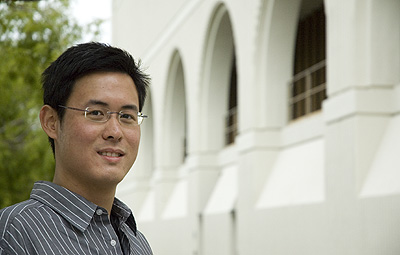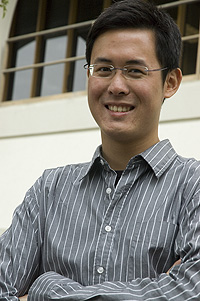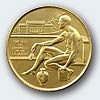UC Berkeley Web Feature
 |
Siu-Ting
Mak in front of Davis Hall, home of Berkeley's civil
engineering program. (Photos by Bonnie Azab Powell) |
Civil engineering major Siu-Ting Dickson Mak spans disciplines and cultures
BERKELEY – University Medal finalist Siu-Ting Dickson Mak's passion for bridges extends beyond the kind that span rivers and canyons. During his four years at UC Berkeley, Mak has used his skills as an engineer and musician — and his determination to reach out wherever he sees a need — to build bridges between young people and old, musicians and scientists, Asians and Americans.
It was a research assignment that hooked Mak on the steel-and-concrete structures that connect people across bodies of water. Abolhassan Astaneh-Asl, a professor of civil and environmental engineering, asked the civil engineering student, then a junior, to gather information about self-anchored suspension bridges. Mak scoured the world literature and came up with a report on every such structure in existence — about 20 in all, including bridges in Japan, Germany and South Korea.
Astaneh-Asl called Mak's report "one of the most professionally done undergraduate research works I have seen in my more than 30 years in academia." And the project got Mak thinking about how civil engineers unobtrusively smooth the way for society with infrastructures like roads, foundations, water treatment plants and air pollution control systems.
It's a role he finds appealing.
 'I want to affect people's lives. Not in fancy, wonderful ways. But in implicit ways — something that people might not even notice.' - Siu-Ting Mak |
"I want to affect people's lives," Mak says. "Not in fancy, wonderful ways. But in implicit ways — something that people might not even notice. But if they do, they would appreciate its benefits."
The people in the senior homes that Mak visits every other week definitely appreciate the benefits of his piano playing. Mak joined Cal Community Music during his first semester in Berkeley, when he noticed a flyer describing the group's mission of performing live music of all kinds at convalescent hospitals and retirement centers in the East Bay. He's continued with the group during his four years on campus, serving as one of its main coordinators since his sophomore year.
Discovering the happiness the group's concerts kindled in its audiences proved a revelation for Mak. "I hadn't realized before that I could integrate my interests into community service," he said.
If he'd chosen to pursue a career in music rather than engineering, it's likely that any of the country's top music academies would have welcomed him with open arms. Having taken piano lessons since the age of five, his skills immediately impressed Michael S. Orland when he first played for him some three years ago.
"I recognized that Siu-Ting was one of the best new players auditioning," said Orland, a lecturer in musicianship and piano in UC Berkeley's music department. "Once the class was under way, he proved to be even more sophisticated than I'd imagined."
Orland says that he's particularly impressed by this engineering student's taste for demanding contemporary music and eagerness to negotiate virtually all of the technical, rhythmic and textural difficulties involved in learning it. "His excellence creates opportunities for me to teach especially difficult repertoire," he said.
Mak shies away from solo performances, preferring the teamwork involved in chamber music. "The musicians in a chamber group are not as explicit as solo performers," he says. "People can enjoy the music instead of looking at a solo pianist as a star and saying, 'Oh, wow! He's great!'"
The first member of his family to attend college, Mak credits his parents for instilling in him the desire to learn and excel. "Over the years, they gave the best for me and my sister," he says. "Especially my mom. Actually, she sacrificed her career to stay at home and work for both of us."
Neither his father — who drives a truck for his own small trucking company — or his mother speak English, but when Mak started studying the language when he was six, his mother asked if she could learn it with him. She had her son translate words, explain phrases, and practice speaking with her. "She saw that I gained a better understanding of English, so this is why she did this," he says.
When Mak achieved top grades in high school, it was his mother's idea for him to apply to colleges in the United States. Mak calls his choice of attending UC Berkeley the best decision he made in his life: "This university focuses on academic research; to me, academic pursuit and research is more important right now than preparing for my future career." (His sister started studying business at San Francisco State University last fall.)
 The
University Medal The
University MedalEstablished in 1871 by California Governor Henry Huntly Haight, the University Medal honors UC Berkeley's most distinguished graduating senior. Three to five students are also named as finalists. [an error occurred while processing this directive] |
Encouraged by both parents to go into medicine, Mak explored bioengineering during his first year at Berkeley, but quickly discovered that the isolation of working in a lab was the wrong choice for him. A sociable person who enjoys math and physics more than chemistry and biology, he discovered that civil engineering's tangible projects and emphasis on teamwork suited him perfectly.
"I enjoy building large, visible models rather than working with test tubes," he says.
Last fall Mak joined the Katrina Recovery Task Force student volunteer group as a member of a team investigating structural aspects of levee failures. This led to his current project, working with two other civil engineering students on an analysis of how the Sacramento river levee system would fare in a large earthquake. The team inspected portions of the levees and ran the information through a computer model they'd built to see whether they might liquefy in a quake.
The results weren't very cheerful. "It's very interesting to see that there actually might be a problem in Sacramento if we don't fix it now," Mak says. His team's proposal? Build a second levee system behind the first. An expensive alternative — but one that could stave off a major disaster.
Mak not only jams research and music into an intense schedule of classes while maintaining a 3.987 grade-point average, but for the past two years he's also found about eight hours a week to tutor physics at the Student Learning Center. Although it's paid work, it meshes with his philosophy of quietly using his skills to help others.
Mak is such a talented student that the science programs coordinator at the center, Richard Gibson, was cautious about hiring him at first, based on his experience that many gifted students have difficulty tutoring because they have not had the experience of struggling with the material themselves.
But once Mak started tutoring, Gibson's concerns vanished. Mak is an excellent communicator who talks and assists others "in a very comfortable and unintimidating way," Gibson wrote in his letter recommending Mak for the University Medal. Mak is so good, in fact, that many students come to the center specifically to find him, Gibson added.
In the fall Mak will start UC Berkeley's one-year master's program in structural engineering. When he thinks further into the future, though, he imagines that it may hold multiple stages for him. He knows he'll be a civil engineer and that at some point he'll go for a Ph.D., but he likes to dream about being a musician, too, or using his engineering talents to help improve the standard of living in developing countries.
But his most immediate goal is to become a leading engineer in innovative bridge design. And he already knows where he wants to start: on a bridge being planned between Hong Kong and the Zhujiang River Delta — a bridge that will connect people in his home city with those in the rest of China.

